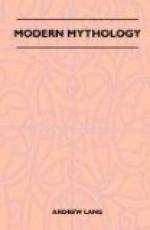Thus the phenomena which the philological school of mythology explains by a disease of language we would explain by survival from a savage state of society and from the mental peculiarities observed among savages in all ages and countries. Of course there is nothing new in this: I was delighted to discover the idea in Eusebius as in Fontenelle; while, for general application to singular institutions, it was a commonplace of the last century. {6a} Moreover, the idea had been widely used by Dr. E. B. Tylor in Primitive Culture, and by Mr. McLennan in his Primitive Marriage and essays on Totemism.
My Criticism of Mr. Max Muller
This idea I set about applying to the repulsive myths of civilised races, and to Marchen, or popular tales, at the same time combating the theories which held the field—the theories of the philological mythologists as applied to the same matter. In journalism I criticised Mr. Max Muller, and I admit that, when comparing the mutually destructive competition of varying etymologies, I did not abstain from the weapons of irony and badinage. The opportunity was too tempting! But, in the most sober seriousness, I examined Mr. Max Muller’s general statement of his system, his hypothesis of certain successive stages of language, leading up to the mythopoeic confusion of thought. It was not a question of denying Mr. Max Muller’s etymologies, but of asking whether he established his historical theory by evidence, and whether his inferences from it were logically deduced. The results of my examination will be found in the article ‘Mythology’ in the Encyclopaedia Britannica, and in La Mythologie. {6b} It did not appear to me that Mr. Max Muller’s general theory was valid, logical, historically demonstrated, or self-consistent. My other writings on the topic are chiefly Custom and Myth, Myth, Ritual, and Religion (with French and Dutch translations, both much improved and corrected by the translators), and an introduction to Mrs. Hunt’s translation of Grimm’s Marchen.
Success of Anthropological Method
During fifteen years the ideas which I advocated seem to have had some measure of success. This is, doubtless, due not to myself, but to the works of Mr. J. G. Frazer and of Professor Robertson Smith. Both of these scholars descend intellectually from a man less scholarly than they, but, perhaps, more original and acute than any of us, my friend the late Mr. J. F. McLennan. To Mannhardt also much is owed, and, of course, above all, to Dr. Tylor. These writers, like Mr. Farnell and Mr. Jevons recently, seek for the answer to mythological problems rather in the habits and ideas of the folk and of savages and barbarians than in etymologies and ‘a disease of language.’ There are differences of opinion in detail: I myself may think that ‘vegetation spirits,’ the ‘corn spirit,’ and




